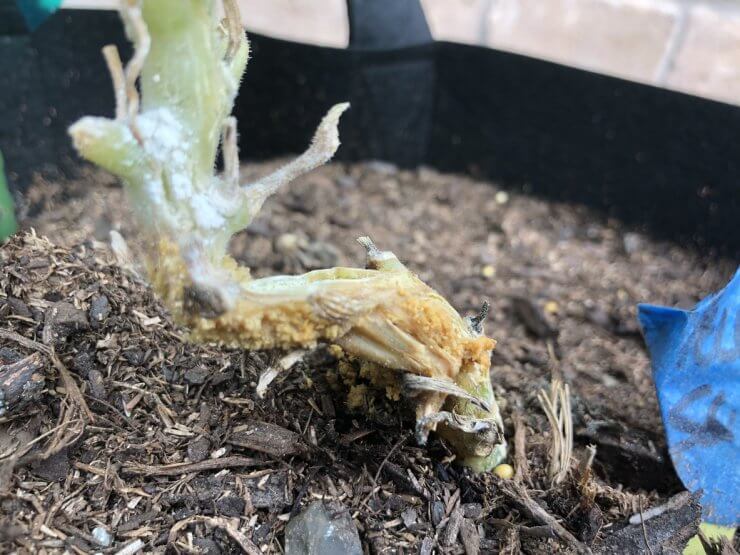
Squash plant damage from a vine borer.
Pests on your winter squash, left unchecked, can damage and destroy your developing plants. Keeping a close watch on your plants during regular daily inspections will help you spot any pests before they can do irreparable harm. Healthy winter squash can bounce back from pest damage if you catch the pests quickly.
A couple notes about prevention:
- Don’t overwater.
- Use floating row covers when plants are young.
- Place sticky traps to catch pests early.
- Use companion plants, such as radishes, to repel pests.
- Nasturtium is said to repel squash bugs.
- In early to mid-summer, sprinkle diatomaceous earth around your young plants, which will kill squash vine borers before they get a chance to invade.
Spot the symptoms of squash plant pests
Check leaves, fruits, and flowers for these symptoms that come from pests on the prowl.
| Symptoms | Pest |
| Yellowing leaves; clusters of small “bumps” on leaves | Aphids |
| Discolored trails on leaves | Leafminers |
| Holes in leaves | Armyworms, Cabbage looper, Flea beetles, Slugs |
| Speckled leaves that turn yellow and brown; wilting plants | Squash bug |
| Eggs on leaves | Stinkbugs, Squash bug |
| Leaves that are silvery or speckled with black | Thrips |
| Leaves cut off at soil level | Cutworms |
| Tiny holes in leaves | Flea beetles |
| Wilting plants; holes in vines | Squash vine borer |
| Symptoms | Pest |
| Dark pinprick points with a lighter border that turns yellow | Stinkbugs |
| Dry wounds on fruit | Armyworms |
| Blemished fruit; fruit death | Squash bug |
How to treat pests on winter squash
Here are some proven ways to get rid of pests on your winter squash. Choose the best treatment for the type of pests invading your plants.
-
- Pick off the pests. Use your garden gloves to remove the pests by hand. After removal, destroy pests by drowning them in a bucket of soapy water or crushing them with your foot. Handpicking isn’t efficient or practical for very small pests but works well with larger pests.
- Trap pests. Some pests that live on the underside of leaves, like squash bugs, can be trapped by setting out a small bowl with 2 tablespoons molasses, 1 teaspoon apple cider vinegar, and a pint of water. The bugs will climb in to drink, then drown.
- Kill squash bug nymphs. Remove and kill squash bug nymphs and adults by dropping them into a pail of soapy water.
- Crush squash bug eggs. Some of these pests, like squash bugs, lay eggs under the leaves. Crush and remove them.
- Blast them. If you spot invaders like aphids, give them a good blast with the garden hose. Chances are the neighborhood birds will notice and come eat your pests.
- Apply insecticidal soap. Insecticidal soap is organic. The potassium salts in insecticidal soap help remove an insect’s protective waxes, causing destruction of insect membranes and killing them. Mix the soap with water to create your solution and apply directly to insects on any plants. While insecticidal soap is less apt to affect other organisms, certain plants might be sensitive to the soap and can suffer leaf burn.
- Apply horticultural oils. Combine plant- or petroleum-based oils with water to produce horticultural sprays. Neem oil, for instance, is derived from seed extracts of the neem plant. Oil-based sprays block an insect’s air holes, interfere with an insect’s metabolism, disrupt insect feeding, and inhibit insect growth. Like insecticidal soaps, horticultural oils can cause plant injury if not properly diluted.
- Make your own pest spray. You can make your own pest spray with benign materials. Mix 1 tablespoon of baking soda, 1/2 teaspoon of a mild dish detergent, and 2 1/2 tablespoons of olive oil in a gallon of water to make a solution that will repel all kinds of bugs, as well as a fungicide for blight and mildew on squash plant leaves. Shake it well in your bottle before spraying and repeat every week for it to be continuously effective.
- Diatomaceous Earth (DE). Sprinkle DE at base of plants and between plants. Many pests cannot cross over this barrier without dying.
- Sticky traps. Leave out yellow sticky traps to nab some of the invaders.
- Floating row covers. Floating row covers can block some pests from getting close enough to your crops to do damage.
Do pests attack your winter squash every year? How do you handle removing them—and even preventing them in the first place? Please tell us how you treat your winter squash to avoid pests.


 Previous
Previous

